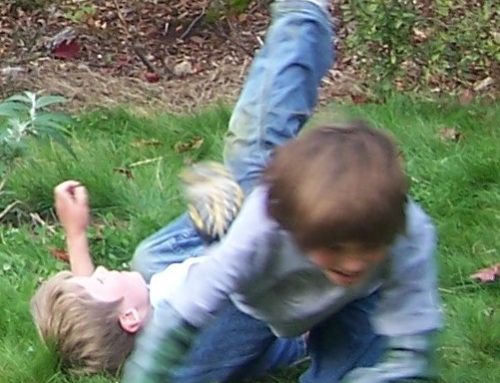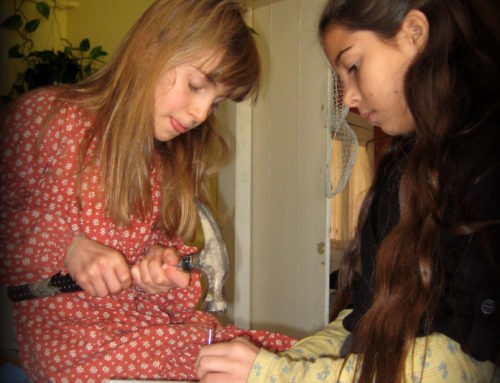Power Over?
Living in the Old Paradigm, we have come to use manipulation, coercion and force to get children to do our bidding. The Old Paradigm, works on a system of punishment and rewards, of absolutes, of “good” and “bad”. We fail to recognize that children have their own needs and interests separable from adults, that they are people in their own right, and are not solely to be acted upon. Not only is such behavior undemocratic, life-diminishing, and oppressive, it has only limited effectiveness. We use coercion and force to get other people (in this case children) to do what we want them to do, often through mechanisms of fear and at the expense of their own authenticity or truth. This creates relationships of domination and fear, and most often breeds resentment by the ones being intimidated.
As mediator psychologist and founder of Nonviolent Communication, Marshall Rosenberg rites:
This objective of getting what we want from people or getting them to do what we want them to do [through means of manipulation, coercion or force] threatens the autonomy of people, their right to choose what they want to do[…] So strong is our need to protect our autonomy, that if we see that someone has a single-mindedness of purpose, if they are acting like they know what’ s best for us and are not leaving it to us to make the choice of how we behave, it stimulates our resistance”.
Problems with Punishment, “Consequences” and Coercion
What his children taught him about using punishment and coercion is this:
that, first of all, I couldn’t make them do what I want. I couldn’t make them do anything. I couldn’t make them put a toy back in the toy box. I couldn’t make them make their bed. I couldn’t make them eat… All I could do is make them wish they had.
And whenever I would be foolish enough to [] make them wish they had, they taught me a second lesson about parenting and power that has proven very valuable to me over the years. That lesson was that anytime I would make them wish they had, they would make me wish I hadn’t made them wish they had. Violence begets violence.They taught me that any use of coercion on my part would invariably create resistance on their part, which could lead to an adversarial quality in the connection between us. I don’t want to have that quality of connection with any human being, but especially not with my children, those human beings that I’m closest to and taking responsibility for. So my children are the last people that I want to get into these coercive games of which punishment is a part.
This concept of punishment is strongly advocated by most parents. Studies indicate that about 80% of American parents firmly believe in corporal punishment of children. This is about the same percentage of the population who believes in capital punishment of criminals… I’ve had plenty of opportunity over the years to discuss this issue with parents, and I’m pleased with how people can be helped to see the limitations of any kind of punishment, if they’ll simply ask themselves two questions.
Question number one: What do you want the child to do differently? If we ask only that question, it can certainly seem that punishment sometimes works, because certainly through the threat of punishment or application of punishment, we can at times influence a child to do what we would like the child to do.
However, when we add a second question, it has been my experience that parents see that punishment never works. Question Number Two: What do we want the child’s reasons to be for acting as we would like them to act? It’s that question that helps us to see that punishment not only doesn’t work, but it gets in the way of our children doing things for reasons that we would like them to do them.”
(read more from this article here )
From win-lose to win-win
In his book, Parent Effectiveness Training (P.E.T), therapist Dr. Thomas Gordon gives extensive examples of the ill effects of power-over dynamics on children and on the parent-child relationship. He describes three approaches to the parent child relationship; the first two involve using power over, while the third is based on cooperation and everyone getting their needs met. In the first method parents “use threats of punishment to influence the child to obey and mete out punishment when he does not. When conflict arises between the needs of the parents and those of the child, these parents consistently resolve the conflict in such a way that the parent wins and the child loses”. The second method involves the child using his power (temper tantrums, guilt tripping, non-cooperation) to get what he wants. “When conflict occurs between the needs of the parent and those of the child, rather consistently it is the child who wins and the parent who loses”.
I truly believe that neither overpowering children nor allowing them to overpower is constructive, useful or creating the kind of compassionate and peaceful world I envision. In the New Paradigm my vision is for adults and children to act in accordance to Dr. Gordon’s third approach, which he calls the no lose method, to develop constructive and cooperative relationships in which neither person overpowers the other and in which everyone’s needs can be met.
If we care about the quality of relationships we have with our children, if we want our children to trust and not to fear, to seek peace and cooperation rather than domination or revenge, we must cultivate that with them. If we use punishment and force what we are teaching our children and the kind of world we are creating is also one in which people seek to use force, violence and domination to get their way at the expense of others. Recognizing the limitations and violence of punishment, there are many that advocate for a system of rewards.
Use Rewards instead of Punishment, Right?
Again Marshall Rosenberg writes:
Many people believe that it’s more humane to use reward than punishment. But both of them I see as power over others, [] And in power with people, we try to have influence not by how we can make people suffer if they don’t do what we want, or how we can reward them if they do. It’s a power based on mutual trust and respect, which makes people open to hearing each other and learning from each other, and to giving to one another willingly out of a desire to contribute to one another’s well-being, rather than out of a fear of punishment or hope for a reward.
If we work with a system of rewards, then we are still seeking to manipulate others into doing what we want, not because they see the value in the activity and how it would contribute to their lives or to ours but only for the sake of reward. Rather than supporting kids in trusting themselves and helping them to identify for themselves what is important or of value to them, we manipulate and coerce them into doing what we have deemed valuable through our “rewards” – a nice way to say bribe. (Yes, I do see rewards as a form of coercion, that is getting someone to do something they would not want or chose to do, and may go against their needs and inclinations, unless the reward were present)… If you would like to read more about the costs of Rewards, I recommend Alfi Cohen’s book Punished by Rewards
I believe, as both Dr. Gordon, and Marshall Rosenberg, have so clearly illustrated, that any use of power or force (even through coercion or manipulation, including punishment and rewards) over another person is not life enriching, diminishes our respect for their humanness, is oppressive and does not promote a cooperative and peaceful way of life. Let us choose the New Paradigm of Power-With that celebrates each of our gifts, aptitudes, talents and individuality and in which we discover ways to meet our needs that are not at the expense of others (especially of children) and are mutually life-enriching


Leave A Comment